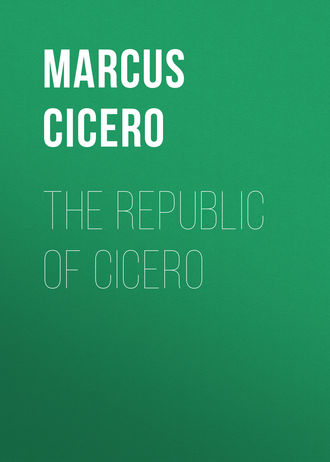 полная версия
полная версияThe republic of Cicero
XVIII. As it is with individuals, so it is with nations. No community is so stupid, as not to prefer commanding by injustice, to serving according to justice. I shall not go far back for examples. Being consul, you assisting me in council; I had to examine the Numantine treaty. Who is ignorant that Pompey made that treaty, and that Mancinus was concerned in the same affair? This last most excellent man supported the proposition I carried from the consultation in the senate; the other most earnestly opposed it. Those who valued modesty, integrity, and good faith preferred Mancinus: yet for his reasoning, counsel, and policy, Pompey took the lead of him * * * *
[An unknown number of pages wanting.]XXIX. * * * * * Ti. Gracchus was vigilant for the interests of the people, but neglected the rights of the Latins and the treaties with the allies. If such customs and license should spread themselves wider, and our empire be changed from right to force, so that those who until now voluntarily obey us, should be ruled only by terror; although it has been vigilantly preserved for us, who are of the present age; yet I should be very solicitous about our posterity, and about the immortality of the republic, which might be perpetual, if the institutions and manners of our forefathers were preserved.
XXX. When Lælius had thus spoken, all present expressed themselves to have been very much delighted by him, but Scipio, among the rest, as if quite elated with pleasure, “many causes,” said he, “indeed Lælius, hast thou often defended, in such a manner that I can by no means compare our colleague Servius Galba to thee; whom when he lived thou preferredest to all; nor in truth any of the attic orators * * *
[Twelve pages wanting.]XXXI. * * * * * Therefore that common interest, that is the commonwealth, who can recognize it when all are oppressed by the cruelty of one; when no bond of Law exists, nor that consent of congregated society, which constitutes a people. And this very condition of the Syracusans: a celebrated city, as Timæus says, the first among the Greeks, and the most beautiful of them all: its harbour embosomed within the walls, its canals running through the city: its broad streets, its porticoes, temples, fortifications, all these did not help to constitute a commonwealth, while Dionysius reigned. The people had no part in them, for the very people belonged to one man. Therefore where there is a tyrant, it is not a vitiated commonwealth, as I said yesterday, but reason compels us to declare plainly that no commonwealth at all exists.
XXXII. “Indeed” said Lælius, “you speak very clearly, and I already perceive the drift of your discourse.
S. You see therefore, that when every thing is in the power of a faction, neither can that be properly called a commonwealth.
L. I judge it plainly so.
S. And most rightly do you judge, for what was the condition of the Athenians, when after that great Pelopponesian war, thirty men were most unjustly placed in the command of that city? Did the ancient glory of the city, the admirable nature of its buildings, its theatre, gymnasia, its noble porticoes, its citadel, or the admirable works of Phidias, or the magnificent port of Piræus, did they constitute a commonwealth? “Not in the least” said Lælius, “because indeed the common interest was not thought of.”
S. How was it at Rome, when the Decemvirs existed without appeal, in that third year, when liberty itself had parted with its privileges?
L. Nothing was left to the people, and truly it was necessary to bring them to that point, that they might recover their rights.
XXXIII. S. I come now to the third kind, that in which some inconsistency will perhaps be perceived, where all things are said to be done by the people, and to be in the power of the people. When the multitude orders punishments to be inflicted in any manner that it pleases, ordering, seizing, keeping, dissipating every thing whatever they choose, can you then Lælius, deny that to be a republic, where all things belong to the people, and when indeed we define a republic to be a commonwealth?” “There is nothing,” said Lælius, “I would sooner deny to be a republic, than where all things are in the power of the multitude. We did not consider that they had a republic among the Syracusans, or at Agrigentum, or at Athens when they were under tyrants, or at Rome when under the decemvirs. Nor do I see how the name of republic is appropriate when the multitude rules. Because first, as you have happily defined it to me, Scipio, a people does not exist, but where it is held together by consent of law; and this sort of mob, is as much a tyrant as if it were one man. Indeed it is more mischievous, for nothing is more ferocious than the wild beast which assumes the name and form of the people. Nor is it right, when the property of maniacs is placed by law under the guardianship of kindred, that * * *
[Eight pages wanting.]XXXIV. * * * of it,24 it may with as much propriety be said that it is a republic and a commonwealth, as it may be said of a kingdom. “And much more,” said Mummius, “for a king being one, is more like a master; but where many good men are at the head of affairs in a republic, nothing can be more happily constituted. But I certainly prefer a kingdom to the sway of a democracy; which third and most vicious kind of government remains for you to explain.”
XXXV. To this Scipio replied, “I recognize well Spurius, your steady aversion to the popular mode, and although it might be treated with less aversion than you are wont to do, nevertheless I agree, that of all these three kinds, no one is less to be approved of. I do not however agree with you that the better class are to be preferred to a king; for if it is wisdom which governs a state, of what consequence is it, whether it resides in one, or in many? But in our discussion we are led into a sort of error. When we call them the better class, nothing can be conceived more excellent, for what can be imagined more desirable than the best? When however a king is mentioned, an unjust king occurs to our minds. We do not nevertheless intend to speak of an unjust king, in our examination of this royal kind of government. Think of Romulus, Pompilius, and Tullus as kings, and perhaps you will not be so displeased with that kind of government.
M. What sort of praise then is left for a democratic government?
S. What did you think, Spurius, of the Rhodians, with whom we were together; did you see nothing like a commonwealth there?
M. Indeed I did, and least of all to be blamed.
S. You say well. But if you remember all were alike; sometimes plebeians, sometimes senators; and by turns discharging during certain months their functions as senators; the other months they remained in the ranks of the people. In both capacities however they had the privilege of being present at the meetings for deliberation, and equally in the theatres and in the courts, great matters and all others were judged; so numerous was the multitude and so great its power that * * * * *
BOOK IV
II. * * * * * * How conveniently the orders are set down; the ages, the classes. The equestrian order where the senate votes. Too many foolishly seek to abolish that useful institution, hoping that through some Plebecists procuring the sale of the horses, they may get a largess.
III. Look now at the other provisions so wisely made, that the citizens may enjoy a happy and honest state of society, for that is the very motive for their union; and which government ought to secure to men, by institutions and laws. In the first place, as to puerile discipline for free-born young men, respecting which the Greeks have laboured so much in vain; and the only matter about which our guest Polybius reproaches the negligence of our institutions. No defined system, or of a public nature, or uniform for all, was decreed by the laws.
[Four or eight pages wanting.]IV. * * * * * * nor naked when at an age of puberty. So deep did they seek as it were to lay the foundations of modesty. But how absurd the exercises of youth in the Grecian Gymnasia; how trifling that drilling of young boys: what loose and unrestrained manners permitted to them. I say nothing of the Eleans and Thebans, among whom free license and permission was given to the young people to indulge in sensuality. The Lacedemonians too, when they allowed every sensual indulgence short of violence, among their youth, were destroying what they were granting such a slight protection to. “I clearly understand, Scipio,” said Lælius, “that in these practices of the Greeks, which you reprehend, you had rather attack the most illustrious people, than your favourite Plato, whom you do not assail at all, especially * * * * *
BOOK V
II. * * * * * * No prerogative more royal than the administration of justice, in which was comprehended the expounding of rights, for individuals were accustomed to seek justice from kings. On which account the lands, the fields, the groves, the extensive and rich grazing districts were defined, which belonged to the sovereign, and were all managed without any care or labour on his part; that none of the cares of private business, might abstract him from the affairs of the public. Nor was any man an umpire or arbitrator of any legal contention, but all things were decided by royal judgments. And it seems to me, that our Numa chiefly adopted this ancient custom from the kings of Greece. For the others, although they also discharged this function, yet a great many of them waged wars, and occupied themselves in establishing the rules of war. But that long peace of Numa, was the parent of law and religion to this city. He also was the writer of those laws which you know to be extant: all which is appropriate to the very citizen whose character we are drawing * * * * * *
[An unknown number of pages wanting.]III. S. Do you think there is any harm in his being acquainted with the nature of roots and seeds?
M. None, if only his work is not neglected.
S. But do you think it to be properly the study of a farmer?
M. Not in the least; for the cultivation of the land would often be unattended to.
S. Therefore, as a farmer is acquainted with the nature of his soil, a steward with the nature of letters, and each can turn from the amusement of theory to the greater utility of practice; so this our ruler may be thoroughly conversant with the knowledge of rights and of laws; he may have looked even into the very fountains of them: but let not his consultations, his constant readings, and his writings occupy him too much; but let him be as it were both steward and farmer to the commonwealth. Let him be skilled in the principles of law without which no man can be just; let him not be ignorant of civil law: but let it be as the pilot who studies the stars; the physician who studies the nature of plants and minerals; each turning his knowledge to the benefit of his art, without permitting it to impede the practical use of his vocation * * *
[An unknown number of pages wanting.]IV. * * * * In those states where the good look for praise and honour, and fly from ignominy and disgrace. Not so much restrained by apprehension of the penalties established by law, but by a sentiment of self-respect, which nature has planted in man, a sort of dread of deserved censure. This sentiment the ruler of a state strengthens by public opinion, and confirms by education, and by institutions, that shame may deter the citizen from crime as much as fear. But these considerations properly belong to renown, and shall be more abundantly considered.
V. Life, however, and the comfortable enjoyment of it, are constituted by legal marriages, lawful children; the keeping hallowed the seats of the penate gods, and the domestic lares; that all may enjoy public and private comforts. Without good government, private life cannot be agreeable, nor can any one be more happy than in a well regulated state * * * *
1
His. Nat. 18. 3. 1.
2
Cato de Re Rustica. Majores enim nostri, &c.
3
Dio. 11. 8. Gellius xv. 27.
4
Roma patrem patriæ Ciceronem libera dixit. Juv. 8.
5
Magna Voce me vere jurasse juravit. Ep. fam. 5. 2.
6
Quoniam, inquit, meos tam suspicione quam crimine judico carere oportere. Suet. J. Cæs. 74.
7
Sed quoniam qui nihil possunt, &c.
8
Ep. fam. 8. 14.
9
“Quid porro aut præclarum putet in rebus humanis.” Lib. 1. xvii.
10
Let. to Att. vii. 3.
11
Lact. Inst. vi. 8.
12
Pecuniosi.
13
Locupletes.
14
Plato.
15
Asses dare.
16
Carthage.
17
γὲροντας in the MSS.
18
This passage appears to deserve a note. The words “nexa” and “nectier” are used in the original. And at the first glance, the passage, connecting it with the well known custom of keeping debtors in chains, as well as the memorable occasion which produced this insurrectionary movement, would appear to declare, that all kinds of bondage for debt were abolished in future. In early periods, whoever was unable to pay his debts, was adjudged by a decree of the prætor, to discharge them in personal services: for which purpose his person was delivered to his creditor; whose slave in every sense of the word he thus became, until the debt was discharged. A debtor thus situated was termed “addictus” or sentenced. Livy, vi. 36., relates “that those against whom judgments had been given, (addictos) were led out daily in herds from the Forum, to the mansions of the patricians, which were filled with enchained debtors: and that wherever a patrician dwelt, there was a private prison.” That all debtors were subject to actual bonds, appears from every indebted person under voluntary judgment, being called “nexus,” meaning linked or chained; and probably when judgment was passed, debtors were delivered in that condition to the creditors. But “nexus” changed its meaning, as the word “bond” has done in our language, where we bind ourselves only with forms. The urgent necessity of the plebeians, arising out of the exactions of the patricians, obliged them to borrow money at usury; and upon such occasions, for money weighed out to him “per æs et libram,” before witnesses, the borrower pledged his person and liberty to the lender as security for the debt. This voluntary act, which was equivalent to a modern confession of judgment, constituted the debtor a “nexus;” before the period of payment had expired, at which time only he was liable to fetters. Upon the occasion of the insurrection mentioned in the passage; a young man of respectable plebeian family, C. Publilius, surrendered himself to Papirius, a patrician usurer, in the place of his father who had failed to redeem himself from his “nexus.” Rejecting the infamous propositions made to him, Papirius caused him to be cruelly scourged. This transaction having roused the people, the senate was obliged to consent to the liberation of all persons who had become “nexi” by their voluntary act, and to order the practice to be discontinued in future.
I have translated the passage in accordance with this view of the subject. Niebuhr, vol. i. 506. Livy, vi. 36. viii. 28. &c.
19
The continuation of this passage is, perhaps, found in Nonius Voc. Exsultare, “which nourishes itself with blood, and which so delights in every kind of cruelty, that it scarcely can be satiated with the sad destruction of human beings.”
20
Professor Mai quotes the following passage from St. Augustin, De. Civ. Dei, as containing a summary of that part of the discussion interrupted here. “And when Scipio had in a more comprehensive and diffuse way, shown how advantageous justice was to a state, and how injurious the absence of it was: Philus, who was one of those present at the discussion, took it up, and proposed that that subject should be very carefully investigated, on account of the opinion which was obtaining, that governments could not be administered without injustice.”
21
Alexander.
22
These are sophisms brought forward in favour of injustice.
Vide Lact. Inst. 5.
23
To restore things unjustly acquired.
24
The better class.











